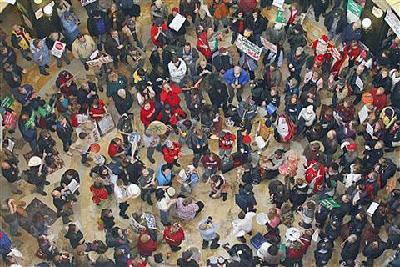
The battle about balancing a budget in the Midwest state of Wisconsin has entered its second week, with no end in sight.
Wisconsin Governor Scott Walker, a Republican, is refusing to negotiate on legislation that would end collective bargaining rights for public sector employees. His proposed $137 million budget repair bill also calls for increased employee contributions to pension and health care benefits.
Democratic lawmakers opposed to the bill have fled the state to prevent the measure from passing. As tens of thousands of people continue to flood the state capitol of Madison to protest, other states are watching developments in Wisconsin as they prepare to tackle their own fiscal problems.
Freezing rain and ice did not keep thousands of protesters from filing into the state capitol building in Madison, as the battle to balance Wisconsin's budget entered its second week.
School teachers, government workers, and even police and firefighters joined the chorus of voices in the Capitol Rotunda opposed to Governor Scott Walker's move to end collective bargaining rights for public sector employees.
"This is ground zero for the nation. We are definitely at the critical point. What happens here is going to be reflective all across the nation." Mahlon Mitchell is president of the Professional Firefighters of Wisconsin.
He admits that firefighters - along with police and other safety officers - are exempt from Walker's controversial plan to close a $137-million budget deficit. His organization still opposes, however, changes to collective bargaining rights.
"I think if the bill passes, it tells other governors that they can fight organized labor," said Mitchell.
"Wisconsin is kind of a test case," Dennis Dresang is a professor emeritus of Political Science and Public Affairs at the University of Wisconsin. He said the final outcome of the budget fight in Wisconsin could have a ripple effect throughout the United States, especially in states facing dramatic budget deficits.
"This is going to have the biggest implications for those states where Republicans control the Governors office and both houses of the state legislature," said Dresang. "So we're talking especially about Ohio, for example, which seems poised to do this, Indiana, and a number of other states."
New Jersey Governor, Republican Chris Christie said he supports Walker. Christie is on the verge of a showdown with unions as he unveils his state budget.
Dresang said Christie and other governors may find the resolve to limit the power of unions in their states based on what happens in Wisconsin. "If Wisconsin succeeds, I think it will embolden other states to do the same kind of thing. If it falters in Wisconsin, I think that other states may proceed a little more slowly on this and not be so drastic in terms of the kinds of rights they're talking about taking away."
But the ever increasing number of people braving inclement weather in Madison just to have their voices heard is having an impact outside the state of Wisconsin, according to firefighter Mitchell.
"We just got word that the governor of Michigan said that he doesn't want to fight organized labor because of what he sees here in Wisconsin," said Mitchell.
But it appears Governor Walker does plan to continue his fight against organized labor in an effort to balance this year's budget, and beyond. Wisconsin also faces a $3.6-billion budget shortfall over the next two years.
"What we're proposing in this budget adjustment bill is really about our commitment to the future," said Walker. "And if we fail to make that commitment we're ultimately going to have to deal with the consequences, not only ourselves, but the consequences we'll pass on to our children and their children into the future."
As Walker refuses to budge, Democratic lawmakers refuse to return to the state capitol to vote on the controversial measure.
Lawmakers need a quorum for the measure to pass, which requires at least one Democrat to be present for the budget repair bill vote in the Republican controlled legislature.
quorum: the smallest number of people who must be at a meeting before it can begin or decisions can be made(會(huì)議的)法定人數(shù)
Obama, Boehner and America's newly divided government
President Obama, Republicans clash over jobs, health care
Major economies caught in debate between debt and growth
Domestic, global economic shifts force US organized labor to change
(來(lái)源:VOA 編輯:崔旭燕)
